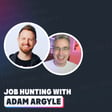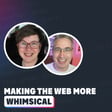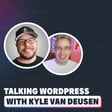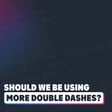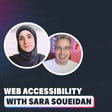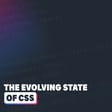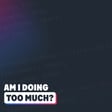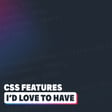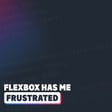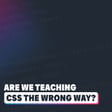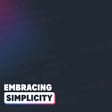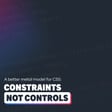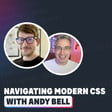Introduction to Podcast and Focus on CSS
00:00:00
Speaker
Hello, my front-end friends, and welcome to my podcast, General Musings. My name is Kevin, and this podcast is where I just like to talk about stuff, usually in some way that's tangentially related to front-end development and often specifically CSS. So today it's more of the tangential stuff, because I want to talk a little bit more about
Discussing Stubbornness in Learning from Newsletter
00:00:19
Speaker
learning. And before you leave, if you're like, Kevin, you keep talking about this, it's going to be a little bit different than the things I've talked about before.
00:00:26
Speaker
And the reason it even comes up is in my newsletter this week, I was talking about how people are sometimes stubborn with taking on advice. I see people often asking for advice on different ways of learning. It's a question I get a lot on how people can make the most of online learning. So it's something I've talked about many times, and I'm not going to do that necessarily today.
00:00:47
Speaker
But I want to talk a bit about how people get stuck in their ways, even when they hear advice and then they dismiss it because they're just like, oh, that won't work for me.
Debunking Learning Styles Myths
00:00:57
Speaker
And that was sort of what I was talking about in the newsletter. But what I didn't mention in there was I think one of the reasons that people dismiss things outright like that is because it doesn't go with how they prefer to learn. And I get it. We all have different ways that we prefer learning. But there's a big difference between
00:01:16
Speaker
the way that you prefer to learn and the best way to learn. And those are very different. And there's a really good video on Veritasium from a few years ago. So I'll link to that in the show notes where he talks about how the whole learning styles thing is a complete myth. I learned about this back when I was in university to become a teacher.
00:01:38
Speaker
10 years ago, we were talking about that. And I think it's even longer than that. The whole learning styles thing was debunked long ago, even though there's tons of quizzes you can do and online things. And it's often even taught in school still today that everybody has their own learning style. I'm a visual learner or I'm a kinesthetic learner. I learn by doing stuff and all of that. The real way that people learn is just the multimodal approach.
00:02:06
Speaker
the more different things you do to learn something, the better. So you read about it. Then after reading about it, you watch someone do it. And then after watching them do it, you try it yourself. And then after trying it yourself, you do something else, whatever it is, mixing up as many different ways of learning something is always going to be the most beneficial. And that's why for me, it's always frustrating when I suggest things and people just dismiss it outright saying, well, that will never work for me. I won't try it because that's just,
00:02:34
Speaker
It doesn't go with how I like to do things. But if you're trying to learn something new and you're asking for advice on how to do it, you should be willing to try things that might seem different or uncomfortable and not fit with what you're currently doing.
Tips on Scheduling Learning Time for Efficiency
00:02:49
Speaker
And this has been really important for me. And it's one of the things I've talked about. And I mentioned this in the newsletter. I said I wasn't going to reference back to it. But it was when I talked about scheduling learning time.
00:03:01
Speaker
I guarantee you most people that I suggest that you don't actually do it. And even for me it was a hard thing to do because it just seems weird to put that on your schedule and then there's always something more important to do and other stuff. But that's why it's so important to schedule it. And I know for me that was actually really impactful and it really helped me make sure that I was making the most of things because I had it on my calendar and it actually
00:03:27
Speaker
did more than just help me learn because I had my scheduled learning time where I put other things aside. Okay, this is what I'm doing now. It took me a long time to do it because I'm not a scheduler. I'm not good at following my calendars and other stuff like that and having a whole bunch of, you know, laid out tasks. It's just not the style that I like to do. But I saw that was actually being really effective for me. And so it actually made me start using my calendar more and for other things.
00:03:56
Speaker
So I have specific times on my calendar for writing my newsletter, for recording this podcast, for working on my YouTube videos, for doing my accounting, for doing all my other things. And I went from someone who didn't use a calendar at all, right? And just sort of winging it as much as possible to being much more organized. And what it led to was me being much more organized and much more efficient with my time overall.
00:04:20
Speaker
So the first step there was because I just wanted to try something with learning and making sure that I would actually do it was the big thing because the idea with scheduling things if you haven't heard me talk about it before when it comes to learning is to prevent yourself from overdoing it early on and just binging through a whole bunch of content and then
00:04:40
Speaker
after three days of doing that, never going back to those lessons again and continuing with the course because I'm sure everybody's done that. I hope I'm not alone on it. If that's the type of thing you might do, you sort of slow, having it on your schedule helps slow you down early on and then later on it helps you keep going because it's there and okay, that's what I'm doing now. And so I think it's really important we don't dismiss things just because they're not what we
Creating Multimodal Online Courses
00:05:06
Speaker
want to do. And it's even why in my courses now,
00:05:09
Speaker
course I'm working on now and that I'm actually getting close to the end of it finally, which is beyond CSS, where I wanted to make sure that it would be multimodal. I don't know if some people get surprised because when they first get into the course, the first four lessons are only written content. If you're used to me and following me on YouTube, you're probably someone who says I'm more of a video or visual learner, I guess.
00:05:32
Speaker
And so you get all this written content and it might be a little bit of like, oh, this isn't what I signed up for. But I do say very early on in one of those first lessons that no, it's not just written, but there will be more writing because I want people to go through the text and then have little challenges and code they can play with to make sure they understand what they're reading about. And then seeing videos that go through and show how things can be put into action and all of that, and then projects for them to work on and everything. So for me, that's really important with
00:06:02
Speaker
online courses is finding ways to help the student as much as possible. And I find that really hard. Teaching in the classroom is a million times easier for the teacher and it's something I've been struggling with a lot with online courses and creating content to help people learn.
00:06:17
Speaker
is trying to make it as easy for the student as possible to learn. And for me, the way to do that is to try and make it as multimodal as possible and make sure there's challenges and that every answer is given. Because you can do that in the classroom. You can give a project and you know they know most of the stuff to be able to do it and then let them figure it out from there. But the advantage of the classroom is if somebody's stuck, you can just come in and get them over to that hurdle or point them in the right direction.
00:06:45
Speaker
You know, reference back to that other thing you did and then all of a sudden it clicks and they can solve it. Whereas you can't do that when you're not in the room with the person seeing what they're struggling with.
Flexibility in Learning Methods
00:06:55
Speaker
So obviously it does present some challenges there. But I'm self-taught. So I've gone through the whole self... Even self-taught is a little bit of a misnomer because we're usually relying on courses and other stuff. But yeah, it is very different from doing in-person learning. So
00:07:12
Speaker
Anyway, just to say, don't get stuck in your ways. If you feel like you're trying to learn something and you're struggling with something, try different things. Don't look for another video and then another video and then another video. If the concept's not sticking for you, go and look up a blog article or go and ask somebody somewhere and play around with some code and
00:07:29
Speaker
Whatever it is, try different things and see if that helps a little bit because people do get stuck in their ways and I'm guilty of this as well. I talk about this and I still catch myself doing things where I keep going back to the same things that I'm most comfortable with. I do think that is one thing that is true is even if you do have a learning style, quote-unquote, that isn't really beneficial for your learning,
00:07:55
Speaker
I think the one place it can be beneficial is just you'll be more willing to learn something if the content is presented in a certain way. Say you looked at two online courses and one was only text-based and the other one was only video-based.
00:08:12
Speaker
If you consider yourself more of a visual learner, you'd probably be more willing to go with a video-based course and you probably have a bit more success with it, at least getting through, maybe not more success in terms of what you would learn, but more chances of actually finishing it just because you prefer that method of learning. So if you prefer something, I think there is, again, you might not learn more, but you might have a better chance of getting through more
Final Thoughts and Recommendations
00:08:37
Speaker
content. That might be the one thing there.
00:08:39
Speaker
and obviously that's different from like if you're learning in the classroom or something where I think as much as possible we want to mix things up. I guess that's it I sort of got into a little bit of a ramble there and lost my way but I hope you enjoyed this episode. Anyway again I'll put a link to that very same episode in the show notes because I would suggest checking it out and with that thank you very much for listening and of course until next time don't forget to make your corner of the internet just a little bit more awesome.


